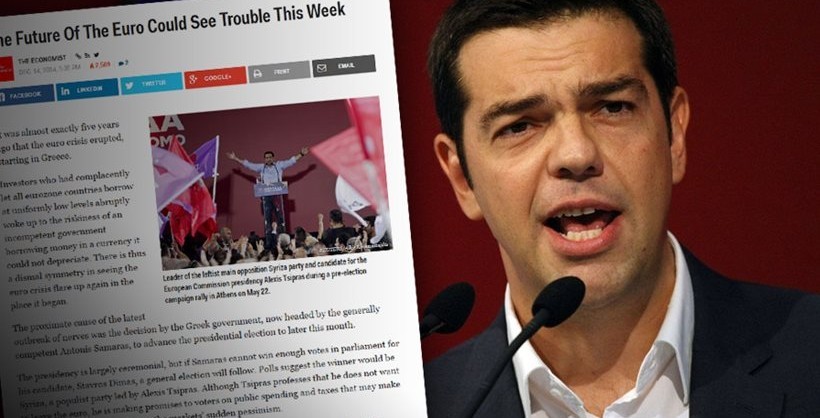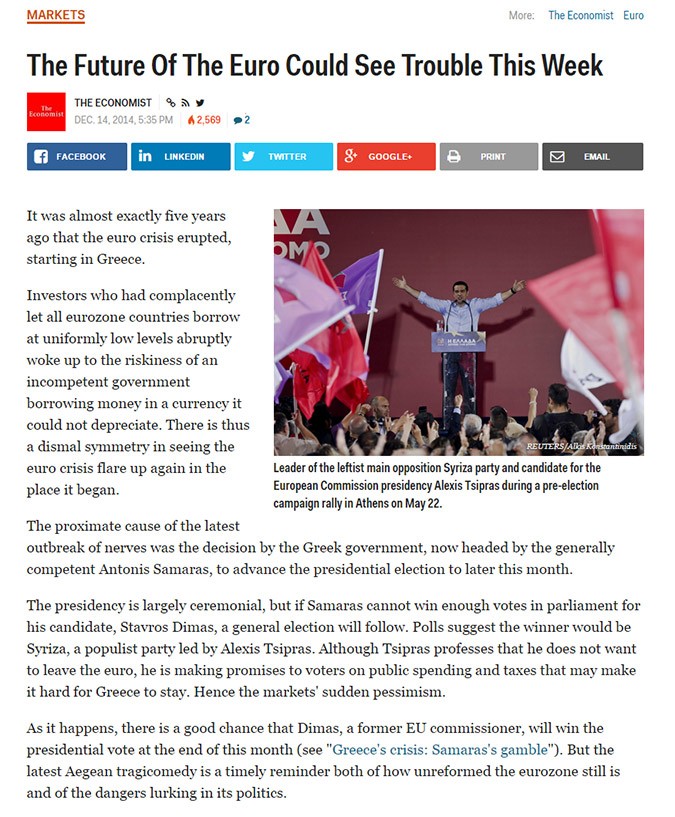The online version of the Economist uses in its article the term “tragicomedy” in order to describe the new crisis arising in Greece and threatens to extend to the rest of Europe.
After highlighting that the first crisis began five years ago from Greece, the Economist stresses that “there is a sad symmetry in the fact that the euro crisis flares up again at the point from which it started. ”
According to the magazine the above fact is not accidental.
Further, the article refers to how the decision by Mr. Antonis Samaras for early elections, was due the nervousness of the markets and lenders.
The populist party is ahead in polls, says the article and continues by saying that although Mr. Alexis Tsipras does not want to leave the euro, however he makes promises to his voters that he will increase public spending and that he will reduce taxes, leading markets to experience a sudden pessimism. ”
The good scenario, according to the article, is for Mr. Stavros Dimas to be elected. However, the last “tragic comedy shows” of the Aegean sea pose a threat to euro”.
Furthermore, among other, the article concludes by saying that: “Indeed, the political risks for the euro are greater now than was back in 2011-12, which had been the culmination of the crisis. Then, the vast majority of ordinary voters chose to stay in the single currency, despite the fact that this meant austerity, as they watched in fear that any other alternative would be even more painful. Now that Europe’s economies are more stable, the risk to leave none of the single currency is smaller. Once the Alexis de Tocqueville said that the most dangerous moment for a bad government is when it starts to beg for reform. If the eurozone does not find a way to boost the development and soon, then he will confirm the saying.
New York Times
On the other hand the New York Times sees developments in Greece from a different perspective.
According to the article “Greece is still far away from chaos.”
The well known analyst of Reuters, Hugo Dixon supports that although Greece has entered a period of political turbulence, which can lead to electoral victory of SYRIZA and this in turn can lead to the extreme scenario of Grexit, but until it happens, he notes, there are other steps to take.
According to Dixon, the first step is the election of the President of the Republic.
If a President is elected, according to Dixon things would be easier for Greece to “swallow” the conditions that would result from the discussions with the Troika and that have to do with the budget of 2015 and the reforms demanded by lenders. In return, Greece will receive the final installment of the program and will enter into a credit line. Moreover it may win more time to repay the debt and then can more easily come to markets and to finance itself. ”
But, if President does not get elected, then “If Samaras wins the election, then he will continue negotiations with the Troika. He will try to scare voters in order to support him. However, it is unlikely to win the election since Tsipras has the lead. ”
So, the question arising is what SYRIZA will do once taking over the reins.
Among other, the New York Times report that although SYRIZA is in the lead in the polls and may win the elections, will not have the necessary majority to govern alone. So SYRIZA will most probably seek partnerships to form a government from PASOK and the POTAMI.


































